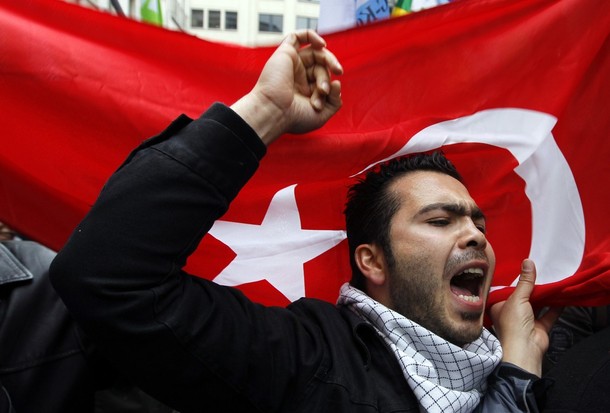
From the Economist: Some Western countries attribute the apparent eastward realignment of Turkish foreign policy in recent years to the Islamist roots of Mr Erdogan’s ruling Justice and Development (AK) party. This week’s Turkish vote in the UN Security Council against sanctions on Iran for its nuclear programme have reinforced this view. Some fear the West has “lost” Turkey (a view echoed this week by Robert Gates, the American defence secretary, who blamed the European Union for not doing more to encourage Turkish membership). …
Turkey is at odds with America, and not only over Israel. Iran was a sore point even before this week’s UN vote. Turkey depends heavily on Iranian gas, and fears that any conflict with Iran might ripple widely. “We are no longer puppets,” declares Mehmet Simsek, Turkey’s finance minister. Better relations with neighbours have opened up markets for Turkish goods. A strong economy amid the global financial crisis (the OECD reckons GDP will grow by almost 7% this year) underpins a new confidence.
There is another element to Turkey’s new foreign policy. Apparent rejection by the EU and the American occupation of Iraq have left Turks in a resentful mood. Mr Erdogan is wary of providing ammunition to Turkey’s (admittedly marginal) Islamist radicals by appearing to pander further to the West. Indeed, Mr Erdogan’s fierce anti-Israeli rhetoric may be partly calculated to counter the appeal of Saadet, an overtly Islamist party that accuses AK of “enriching” its members at the expense of “the cause.”
On Israel, though, the government may have gone too far. Even Fethullah Gulen, Turkey’s most influential Muslim cleric, has lambasted the flotilla organisers. Mr Erdogan’s fiery support for Hamas and his salvos against Israeli “state terrorism” may encourage the radicals rather than appease them. During the recent protests against Israel some demonstrators brandished posters of Hitler, which hardly makes Turkey seem an attractive prospect for the EU. (photo: Reuters)
Image: reuters%206%2010%2010%20Demonstrators%20hold%20Turkish%20flags.jpg
